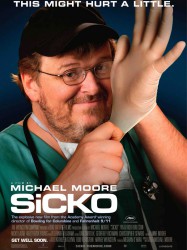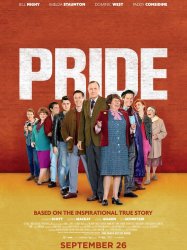Films with theme "Films about the labor movement", sorted by revenue

Sicko (2007)
, 2h3Directed by Michael Moore
Origin USA
Genres Drama, Comedy, Documentary
Themes Medical-themed films, Films about the labor movement, Documentary films about business, Documentary films about health care, Documentaire sur le monde du travail
Actors Michael Moore, Tucker Albrizzi, Billy Crystal, Bill Maher
According to Sicko, almost fifty million Americans are uninsured while the remainder, who are covered, are often victims of insurance company fraud and red tape. Furthermore, Sicko points out that the U.S. health care system is ranked 37 out of 191 by the World Health Organization with certain health measures, such as infant mortality and life expectancy, equal to countries with much less economic wealth. Interviews are conducted with people who thought they had adequate coverage but were denied care. Former employees of insurance companies describe cost-cutting initiatives that give bonuses to insurance company physicians and others to find reasons for the company to avoid meeting the cost of medically necessary treatments for policy holders, and thus increase company profitability.

The Founder (2016)
, 1h55Directed by John Lee Hancock
Origin USA
Genres Drama, Biography, Historical
Themes Cooking films, Films about the labor movement, Documentaire sur la cuisine, Documentary films about business, Documentaire sur la malbouffe, Documentaire sur le monde du travail
Actors Michael Keaton, Laura Dern, Wilbur Fitzgerald, Linda Cardellini, Nick Offerman, John Carroll Lynch
Chronicling the rise of McDonald's fast food empire, The Founder tells the true story of how Illinois salesman Ray Kroc met brothers Mac and Dick McDonald, who were operating a hamburger restaurant in southern California in the 1950s. Kroc subtly maneuvered himself into a position to take control of their company, which grew into one of the world's best-known brands after he bought the chain for $2.7 million in 1961.

C'est la vie! (2017)
, 1h57Directed by Éric Toledano, Olivier Nakache
Origin France
Genres Comedy
Themes L'action se déroule en une journée, Films about the labor movement, La précarité, Films about marriage
Actors Jean-Pierre Bacri, Jean-Paul Rouve, Gilles Lellouche, Vincent Macaigne, Eye Haïdara, Alban Ivanov
Max, un organisateur de mariage expérimenté, doit gérer le mariage de Pierre et Héléna dans un château de prestige. Il doit faire appel à une équipe de serveurs, trouver des cuisiniers, un photographe, un orchestre et un animateur tout en gérant les demandes et problèmes de chacun, mais aussi les siens.

The Women on the 6th Floor (2011)
, 1h46Directed by Philippe Le Guay
Origin France
Genres Drama, Comedy
Themes Films about alcoholism, Films about immigration, Films about the labor movement, La précarité
Actors Fabrice Luchini, Natalia Verbeke, Sandrine Kiberlain, Carmen Maura, Lola Dueñas, Audrey Fleurot
Set in Paris in the 1960s, the film is a social comedy that pits the propriety of a well-to-do French family with the earthiness and humour of Spanish cleaning ladies who work in their apartment building. It follows Monsieur Joubert (Fabrice Luchini), an unadventurous stockbroker, as he befriends the Spanish maids who live on the top floor of his building. Maria (Natalia Verbeke), his new maid, introduces him to her compatriots and their simple but happy lives animated by friendship and folklore, in contrast to the relative emotional austerity of his own life. Slowly he recovers his joie de vivre by tasting life's simple pleasures; when his wife (Sandrine Kiberlain) falsely accuses him of having an affair he moves into an empty room in the servants' quarters upstairs, the first time he has had a bedroom of his own.

The Remains of the Day (1993)
, 2h14Directed by James Ivory
Origin United-kingdom
Genres Drama, Romance
Themes Films about the labor movement
Actors Anthony Hopkins, Emma Thompson, James Fox, Christopher Reeve, Hugh Grant, Ben Chaplin
In 1950s post-war Britain, Mr. Stevens, the butler of Darlington Hall, receives a letter from Miss Kenton, a recently divorced former co-worker employed as the housekeeper some twenty years earlier. Lord Darlington has died a broken man, his reputation destroyed after he had been denounced as a Nazi-sympathiser in the Daily Mail, and his stately country manor has been sold to a retired American Congressman, Mr. Lewis. Stevens is granted permission to borrow his Daimler, and he sets off to the West Country to meet Kenton.

The Accidental Husband (2008)
, 1h30Directed by Griffin Dunne
Origin USA
Genres Comedy, Romantic comedy, Romance
Themes Films about the labor movement, Disaster films, Films about marriage
Actors Uma Thurman, Jeffrey Dean Morgan, Colin Firth, Isabella Rossellini, Sam Shepard, Lindsay Sloane
Patrick Sullivan (Jeffrey Dean Morgan) is looking forward to a life with, Sophia (Justina Machado), until she calls into the show by famed love expert and radio host Dr. Emma Lloyd (Uma Thurman). Emma questions Sophia’s concept of romantic love and advises her to break their engagement, which she swiftly does.

Norma Rae (1979)
, 1h50Directed by Martin Ritt
Origin USA
Genres Drama
Themes Feminist films, Films about the labor movement, Political films, Children's films
Actors Sally Field, Beau Bridges, Ron Leibman, Pat Hingle, Morgan Paull, Barbara Baxley
Norma Rae Webster is a minimum-wage worker in a cotton mill that has taken too much of a toll on the health of her family for her to ignore their poor working conditions. After hearing a speech by a New York union organizer, Reuben Warshowsky, Norma Rae decides to join the effort to unionize her shop. This causes conflict at home when Norma Rae's husband, Sonny, says she's not spending enough time in the home.

F.I.S.T. (1978)
, 2h25Directed by Norman Jewison
Origin USA
Genres Drama, Action
Themes Mafia films, Transport films, Films about the labor movement, Trucker films, L'Outfit de Chicago, Political films, Road movies, Gangster films
Actors Sylvester Stallone, Rod Steiger, Peter Boyle, Melinda Dillon, David Huffman, Kevin Conway
At a loading dock in Cleveland, Ohio in 1937, supervisor Mr. Gant welcomes a new worker, Lincoln Dombrowsky (Frank McRae). Gant tells him the job requirements and pay rules. He'll be paid for working 8 hours and if he has to work overtime, he still gets paid only for 8 hours. If he drops any of the merchandise, the cost comes directly out of his pay. These are examples of unfair working practices faced by the laborers. Later Dombrowsky drops a few carts of tomatoes, which is taken out of his pay; another worker is fired for helping him collect the fallen merchandise. Johnny Kovak (Sylvester Stallone), another worker resentful of mistreatment, leads a riot. Afterward, the workers go to the office of Boss Andrews. Kovak believes he negotiates a deal for the workers, but the next day he and his friend Abe Belkin (David Huffman) are told they are fired.

Polisse (2011)
, 2h7Directed by Maïwenn
Origin France
Genres Drama, Thriller, Crime
Themes Films about children, Pregnancy films, Films about sexuality, Films about the labor movement, Films about pedophilia, Films about child abuse
Actors Karin Viard, JoeyStarr, Marina Foïs, Nicolas Duvauchelle, Maïwenn, Karole Rocher
Les policiers de la brigade de protection des mineurs (BPM) de Paris luttent contre les innombrables sévices subis par des mineurs : traque de pédophiles, appréhensions de parents soupçonnés de maltraitance, suivi d'adolescents pickpockets, adolescents en dérive sexuelle, protection de mineurs sans domicile, mineurs victimes de viol, etc. Plongés dans cet univers éprouvant, ces policiers très impliqués et soudés tentent de préserver leur vie privée et leur santé psychique. Une jeune photographe est envoyée faire un reportage photo dans l'unité chargée des affaires de mœurs.

Antitrust (2001)
, 1h48Directed by Peter Howitt
Origin USA
Genres Drama, Thriller, Action, Crime
Themes Films about computing, Films about the labor movement
Actors Ryan Phillippe, Tim Robbins, Rachael Leigh Cook, Claire Forlani, Richard Roundtree, Nate Dushku
Working with his three friends at their new software development company Skullbocks, Stanford graduate Milo Hoffman is contacted by CEO Gary Winston of NURV (Never Underestimate Radical Vision) for a very attractive programming position: a fat paycheck, an almost-unrestrained working environment, and extensive creative control over his work. Accepting Winston's offer, Hoffman and his girlfriend, Alice Poulson, move to NURV headquarters in Portland, Oregon.

Sorry to Bother You (2018)
, 1h45Origin USA
Genres Science fiction, Comedy, Fantasy
Themes Films about the labor movement, Comedy science fiction films
Actors Armie Hammer, Lakeith Stanfield, Tessa Thompson, Steven Yeun, Patton Oswalt, Terry Crews
Un télévendeur découvre la clé magique qui a conduit à la réussite d'une entreprise et découvre le secret macabre de ses dirigeants.

Capitalism: A Love Story (2009)
, 2h7Directed by Michael Moore
Origin USA
Genres Comedy, Documentary
Themes Films about religion, Films about the labor movement, Documentary films about business, Documentary films about historical events, Documentaire sur une personnalité, Documentary films about politics, Documentary films about religion, Documentaire sur le monde du travail, Political films
Actors Thora Birch, Michael Moore, Robert Powell, Wallace Shawn, Ronald Reagan, Arnold Schwarzenegger
The film begins with a series of security footages of armed bank robberies (one of the robbers was on a crutch) accompanied by the song Louie, Louie. Moore then uses an Encyclopædia Britannica archive video to compare and view modern-day America with the Roman Empire, by juxtaposing depictions of the fall of the Roman Empire with similar modern-day American issues. The film then depicts home videos of families being evicted from their homes, as well as the "Condo Vultures," a Florida real estate agency whose business flourished with the increasing number of foreclosures.

Pride (2014)
, 1h59Directed by Matthew Warchus
Origin United-kingdom
Genres Drama, Comedy, Comedy-drama
Themes Films about sexuality, Films about the labor movement, LGBT-related films, LGBT-related films, Coming out, LGBT-related film
Actors Bill Nighy, Dominic West, Andrew Scott, George MacKay, Joseph Gilgun, Ben Schnetzer
Based on a true story, the film depicts a group of lesbian and gay activists who raised money to help families affected by the British miners' strike in 1984, at the outset of what would become the Lesbians and Gays Support the Miners campaign. The National Union of Mineworkers was reluctant to accept the group's support due to the union's public relations' worries about being openly associated with a gay group, so the activists instead decided to take their donations directly to Onllwyn, a small mining village in Wales, resulting in an alliance between the two communities. The alliance was unlike any seen before and was ultimately successful.

Very Happy Alexander (1968)
, 1h40Directed by Yves Robert
Origin France
Genres Comedy
Themes Films about animals, Cooking films, Films about the labor movement, Films about dogs, Mise en scène d'un mammifère
Actors Philippe Noiret, Françoise Brion, Marlène Jobert, Pierre Richard, Tsilla Chelton, Paul Le Person
Alexandre, homme bon vivant et nonchalant, est cultivateur dans une ferme française de la Beauce. Cependant sa vie quotidienne est dirigée par « la Grande », son ambitieuse mais néanmoins tyrannique épouse, qui le pousse à bout de force en lui imposant chaque jour une liste de travaux démesurée. Devenu brutalement veuf, il éprouve un grand soulagement et se sent libéré de son labeur : il décide de s'accorder un repos qu'il juge mérité, afin de prendre le temps de savourer la vie. Son comportement sème rapidement le trouble dans le petit village par l'exemple qu'il donne, et une partie des habitants décide de le forcer à reprendre le travail. Mais ils échouent, et Alexandre commence à faire des émules…

Men at Work (1990)
, 1h38Directed by Emilio Estevez
Origin USA
Genres Drama, Thriller, Comedy, Action, Crime
Themes Films about the labor movement, Buddy films
Actors Charlie Sheen, Emilio Estevez, Leslie Hope, Keith David, Dean Cameron, John Getz
Carl Taylor (Sheen) and James St. James (Estevez) are a pair of troublemaking garbagemen who dream of owning a surf shop. The two uncover an illegal toxic dumping operation in their own city, Las Playas. The film begins with the pair collecting trash as they usually do, by tossing garbage cans in the street and making noise that disturbs the residents. One of the local cops, Mike, hassles them frequently, but Carl and James seem to have gotten used to this treatment.
 Connection
Connection